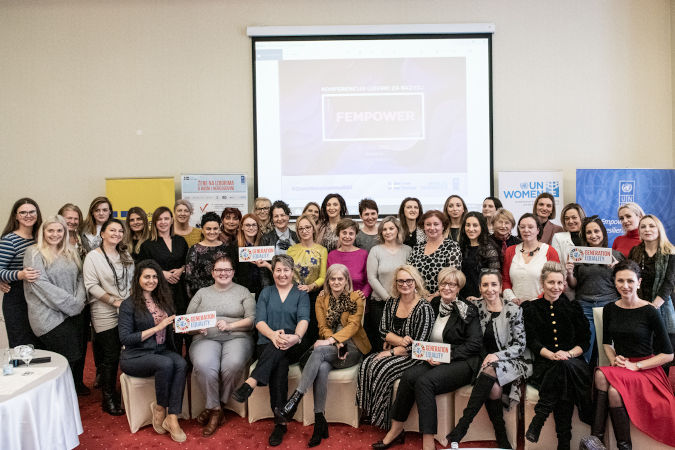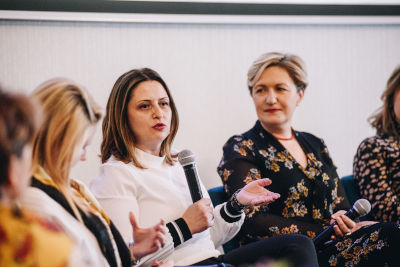FEMPOWER taps into women’s leadership in Bosnia and Herzegovina
A UN Women and UNDP networking event in Bosnia and Herzegovina brought inspirational women together to find ways to improve and develop the potential of women’s leadership across the country.Date:

Leading journalists, activists, entrepreneurs, and politicians in Bosnia and Herzegovina had a rare chance to network and explore ways to increase visibility of women in their communities and encourage them to engage in decision-making processes.
The FEMPOWER conference in Sarajevo, held 21 -23 February, as a part of the “Women in elections in Bosnia and Herzegovina” project, gathered 60 women leaders to share practical experiences on starting their own business and taking more active roles in their community. They also tackled broader, more systemic societal issues like how to break from traditional gender roles.
Sabina Krivdic, an entrepreneur from Visoko, knows first-hand about breaking through traditions. She is the first woman owner of a craft distillery in Bosnia and Herzegovina. During a panel discussion on entrepreneurship, she spoke about creating new opportunities for developing businesses led by women.
“Starting one’s own business is of great importance – not only for women who can then solve their financial challenges or free themselves from unhappy business environments – but for all of society. Women in Bosnia and Herzegovina have huge potential,” said Sabina Krivdic. She emphasized the importance of education and access to additional financial resources before women can fully realize their business plans.

Some of the public lectures at the event focussed on the importance of mental health and self-resilience for women. Ira Adilagic, a hearing impaired young activist for people with disabilities, held a workshop on sign language. She spoke about the value of developing psychological resilience while accepting oneself and also accepting differences. “A community that respects each and every one of its members can discover better solutions and flexibility for all upcoming challenges,” said Ira Adilagic.
Also discussed was the low level of representation of women in politics in Bosnia and Herzegovina.
Dženita Abaza, who comes from Bosnia and Herzegovina, but lives in Sweden where she is serving the second term as the mayor of Kalmar, a Swedish town, shared her experiences as a woman politician. She said that women remain sidelined when it comes to political agreements. “The core of the problem lies in political parties that don’t give equal opportunities to female candidates,” said Dženita Abaza.
Participants mapped out priorities and possible solutions for empowering women's leadership in Bosnia and Herzegovina. Marina Riđić, TV journalist and facilitator of the conference said: “Building a strong mentorship network between girls, young professionals, mid-career females and female leaders is the best possible way to engage women in the decision-making process in our society.”
The “Women in elections in Bosnia and Herzegovina” project is funded by Sweden, and implemented by UNDP and UN Women in Bosnia and Herzegovina, in cooperation with state institutions. Future activities under the project will include support for the creation of innovative social services that could allow women more time for public engagement.